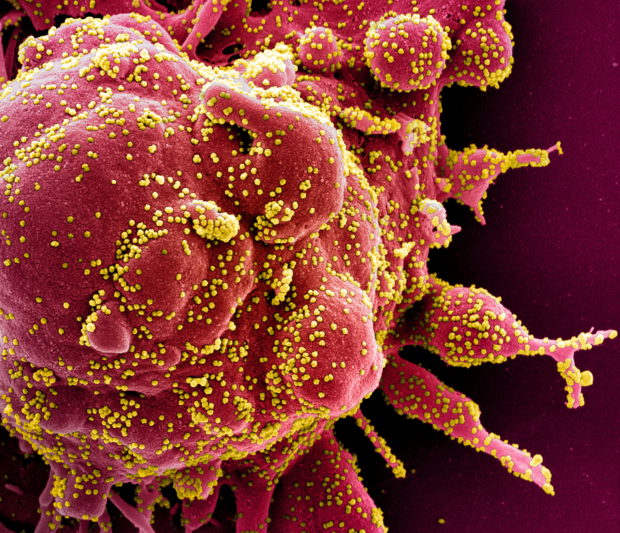Poor sleep history linked with more severe COVID-19 — Harvard research

FILE PHOTO: Colorized scanning electron micrograph of an apoptotic cell (red) infected with SARS-COV-2 virus particles (yellow), also known as novel coronavirus, isolated from a patient sample. Image captured at the NIAID Integrated Research Facility (IRF) in Fort Detrick, Maryland. National Institute of Allergy and Infectious Diseases, NIH/Handout via REUTERS.
Poor sleep habits may be linked with higher risk for severe illness in patients with COVID-19, according to Harvard University researchers.
They analyzed survey responses from more than 46,000 participants in the long-term UK Biobank study, including 8,422 who tested positive for COVID-19.
Participants had answered questions from 2006 to 2010 about sleep duration, daytime sleepiness, insomnia and body clocks.
For the new study, based on their responses, the researchers assigned scores ranging from 0 to 6, with higher scores indicating multiple poor sleep “traits.”
In participants with COVID-19, poor scores were associated with higher odds of death.
Article continues after this advertisementThis was true even after researchers accounted for issues known to be risk factors for poor COVID-19 outcomes such as sleep apnea, obesity and smoking, they reported on Friday in the journal Clinical Infectious Diseases.
Article continues after this advertisementEven people with two occasional or one frequent poor sleep trait appeared to experience higher risks for hospitalization and death, although the difference was not statistically significant and more study is needed to confirm the finding, the researchers said.
Poor sleep affects the immune system and blood clotting, both of which are key to the body’s fight against COVID-19, and “tracking sleep behavior may have importance in identifying those at increased risk for COVID-19 mortality and hospitalization,” the authors said.
‘Circuitry’ problems
Meanwhile, researchers in the journal Nature said the brain inflammation and impaired “brain circuitry” seen in people who die of COVID-19 look a lot like what doctors see in the brains of people who die of neurodegenerative conditions such as Alzheimer’s disease and Parkinson’s disease.
Analyses of brain tissue from eight people who died from COVID-19 and 14 others who died from other causes showed “striking changes” in the COVID-19 patients’ brains, Stanford University researcher Tony Wyss-Coray told Reuters.
His team at Stanford, with colleagues at the University of Saarbruecken in Germany, analyzed thousands of genes in each of 65,309 individual cells taken from the brain-tissue samples.
Genes involved with cognition, schizophrenia and depression were more often “turned on” in the COVID-19 patients’ brains, they found.
“There also were signs of distress in neurons in the cerebral cortex, the brain region that plays a key role in decision-making, memory and mathematical reasoning,” the researchers said in a statement.
“These neurons … form complex logic circuits that perform those higher brain functions.” Wyss-Coray said his team could not find the virus itself in the brain, which suggests that “virus infection in the rest of the body could be enough to cause neurological symptoms, even in people who do not die from the disease.”
The findings, Wyss-Coray noted in a statement, “may help explain the brain fog, fatigue and other neurological and psychiatric symptoms of long COVID.”